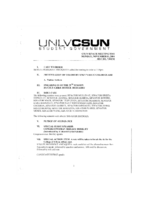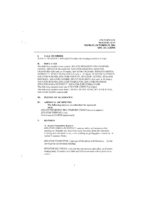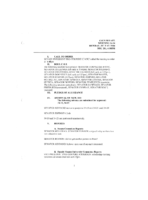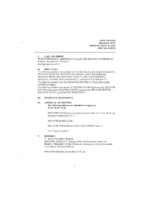Search the Special Collections and Archives Portal
Search Results

Interview with Lawrence V. Robinson, November 23, 2004
Date
2004-11-23
Archival Collection
Description
Narrator affiliation: Tunnel mechanic, Reynolds Electrical and Engineering Company (REECo)
Text

Interview with Roger William Anderson, September 20, 2005
Date
2005-09-20
Archival Collection
Description
Narrator affiliation: U.S. Air Force, Area 51 Command Post; Roadrunners Internationale
Text

Interview with Richard Vaughn Wyman, December 1, 2005
Date
2005-12-01
Archival Collection
Description
Narrator affiliation: Geologist, Asst. Manager of Operations, Reynolds Electrical and Engineering Company (REECo)
Text

Interview with Ernest Benjamin Williams, March 26, 2004
Date
2004-03-26
Archival Collection
Description
Narrator affiliation: Budget and Logistics, Atomic Energy Commission, U.S. Department of Energy
Text

Interview with John Joseph Brown, September 26, 2005
Date
2005-09-26
Archival Collection
Description
Narrator affiliation: Radiological Safety Supervisor, Reynolds Electrical and Engineering Company (REECo)
Text

Meeting minutes for Consolidated Student Senate, University of Nevada, Las Vegas, November 01, 2004
Date
2004-11-01
Archival Collection
Description
Includes meeting minutes and agenda.
Text

Meeting minutes for Consolidated Student Senate, University of Nevada, Las Vegas, October 25, 2004
Date
2004-10-25
Archival Collection
Description
Includes meeting minutes agenda.
Text

Meeting minutes for Consolidated Student Senate, University of Nevada, Las Vegas, August 30, 2004
Date
2004-08-30
Archival Collection
Description
Includes meeting minutes.
Text

Meeting minutes for Consolidated Student Senate, University of Nevada, Las Vegas, July 12, 2004
Date
2004-07-12
Archival Collection
Description
Includes meeting minutes and agenda, along with additional information about bylaws, reports, and contracts.
Text

Meeting minutes for Consolidated Student Senate, University of Nevada, Las Vegas, July 26, 2004
Date
2004-07-26
Archival Collection
Description
Includes meeting minutes and agenda, along with additional information about contracts.
Text
Pagination
Refine my results
Content Type
Creator or Contributor
Subject
Archival Collection
Digital Project
Resource Type
Year
Material Type
Place
Language
Records Classification
